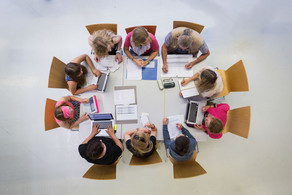Course Types
Lecture? Exercise? Tutorial? There are many forms of events at the university. So that you know what to expect, we have prepared a small overview here. You can also skim it first and then take a closer look when the time comes.
Introduction
Lectures look quite similar everywhere - but when it comes to the question of what a tutorial is, students from different courses of study will probably give you very different answers. Even here, the different types of events are not always clearly defined.
First of all, the good news is that you don't have to register for a course at the beginning. For each subject, you can attend the introductory lecture, where everything else is explained. If questions arise during this, you can help each other with the groups from the orientation week. You will also get mentors who you can write to if you have any problems.
Below we have listed the formats with their usual meanings. There are a few formats with compulsory attendance, but we advise you to attend everything regularly if you want to get through your studies efficiently in the end.
Regular Events
Typically, the lecture is held by a professor. The slides used are usually uploaded to Moodle beforehand.
Of course you are allowed to ask questions during the lecture, but you will certainly not understand every sentence in every lecture. Therefore, you should work on the contents that you did not understand later on yourself.
The contents of the lecture form the basis for all further courses in this subject and of course also for the exam. For exercises, which you then have to solve, you should always have the lecture material and your notes available. Everything that is said in the lecture and is not on the slides, you should write down to keep this information.
There are several possible formats for exercises. Basically, exercises discuss tasks that have previously been uploaded as a worksheet and that are to be solved independently.
Global exercises usually take place in a large lecture hall and are intended for all students taking the subject. Usually a sample solution is presented. This is often done as a transcript or a PowerPoint presentation. You can ask questions during a global exercise, but keep in mind that the instructor will probably want to make sure that all assignments still fit into the time frame.
Small group exercises will remind you of your school lessons: You sit with a group of up to 30 participants in a seminar room and are either presented with a sample solution or asked to participate yourself. Here you should be especially well prepared, because there is usually more time for individual questions than in a global exercise.
Either way, exercises are especially useful if you have dealt with the tasks beforehand. A well copied sample solution is helpful for checking, but it cannot replace independent calculation. Try to find a study group with which you can calculate the exercises beforehand. In general, the exercises are the best preparation for exams in many modules!
If you have to write a compulsory exercise, which is also called a test in some areas, the aim is to achieve admission to the exam.
In the past, a compulsory exercise usually took place in the form of an assignment sheet in the lecture hall, which you had to hand in after 20 or 30 minutes. Nowadays, there are more frequent formats in which you have to fill out a questionnaire online. Overall, there are often short questions about the lecture and short calculations. As a rule, everything that has been covered in lectures and exercises up to this point is relevant.
You will only have to attend seminars at the beginning of your studies. In most cases, the main difference to a small group exercise is that attendance is compulsory in seminars. So you must not miss these dates. In terms of content, assignments are published in advance, which you should prepare. Otherwise, have a look at the section on small group exercises.
Of course, a degree program consists of a lot of theory. Nevertheless, you should also be able to look at exciting experiments yourself and handle laboratory equipment a bit. For this purpose, many courses offer about two practical experiments, which are often required for exam admission.
Most of the time, a lab exercise takes place in a laboratory with a small group of about ten students. There is an experiment document that you have to work on as preparation. This consists of the experiment instructions and preparation tasks. These tasks will be reviewed and discussed at the beginning. You should have understood the instructions at the beginning of the internship so that you can then carry out the experiments alone or often in a group of two or three.
In most cases, you will have to explain finished parts of the experiment to the exercise supervisor and present your records of measured values and diagrams in order for the experiment to be counted as passed. In the "Practical Measurement Technology" in the second semester, reports must also be written as a small written paper. You will be informed about the exact requirements in the test. Do not miss the deadlines!
In the first semester there are weekly practicals for programming in EidP, which are then carried out in the Retina-Pool. Since time is sometimes short there, you should have solved the tasks beforehand.
In some modules, there are opportunities where you can get help from student assistants. Here we have listed the offers that are available in the first semester.
HöMa: Math Helpdesk
The Math Helpdesk is an open service of the math faculty. There you can ask your questions about the math exercises and get an answer from the tutors for the different math modules.
Normally you can find the helpdesk in the seminar room building I in front of room 2.008. Because of Corona the helpdesk has been moved to Zoom.
For more information, visit the Math Helpdesk's own page.
GET: Tutorium & Helpdesk
In Fundamentals of Electrical Engineering there are two formats to support you. In the tutorial the "GET trick box" is presented. This is a presentation that summarizes important content once again and explains it from a student's point of view. In addition, there are calculation phases in which special tasks can be worked on independently and questions can be asked when things get stuck.
The helpdesk is intended for you to come to the tutors with questions about lecture content or math problems, who will then answer your question. This service is available throughout the semester as well as in the days before the exam.
Examination
In order to be allowed to take part in an exam, you often have to fulfill so-called study requirements. These vary from subject to subject and are presented in the first course of each subject.
For some courses you have to hand in some or all of the solved tasks by a certain deadline. These may then be classified in a point system. Similarly, you may be required to demonstrate something on the blackboard in a small group.
You will also often come across compulsory exercises. Most of the time you have to pass three out of four compulsory exercises or you have to collect points through compulsory exercises during the whole semester.
In seminars where attendance is compulsory, you may only miss a certain number of dates. You must also normally take and successfully complete lab exercise tests.
The exam is always the "highlight" of any event. This does not always mean that the fun factor is at its highest, but the exam is always the goal for which you prepare. After all, your exam result also determines the grade you receive for the module at the end.
Always keep in mind that for many exams you need to have fulfilled study requirements and register in time. All formalities will of course be communicated to you in the lectures.
In terms of content, everything that was taught in lectures, exercises, seminars, practical tests, etc. can be tested in the exam. Often a large part of the tasks consists of arithmetic problems, which are similar to the exercises, and of short questions. Less frequently, proofs or detailed derivations are required.
In many cases you are allowed to write your own collection of formulas in advance, which you then take with you to the exam. Often these are only a few A4 pages. Write your formulary independently and summarize everything that seems important to you. Writing the formulary is often a very important part of the exam preparation.
Further aids are often a non-programmable calculator, drawing material (compass, set square) and of course pens that do not write red (because of the correction) and are document-proof (no pencils or fountain pens). Tipp-Ex and the like are not allowed, you should cross out what is wrong.
Corona has also introduced new formats. Since then there is the possibility to write exams online from home. You are usually monitored by webcam via zoom so that you don't cheat. Because this is more difficult to monitor, it may be that more aids are allowed or that you are allowed to use all materials in an "open-book exam". Please note that some materials are not allowed in digital form. The processing of the exams is usually similar to that described above. This means that you work on the calculation tasks on your own pieces of paper and then scan and upload them at the end.
For each subject there are two exam dates, usually one at the beginning and one at the end of the lecture-free period. Which one you choose is up to you. The first date always offers the advantage that you can still take the second date if you became ill on the first date or unfortunately failed.
In some subjects, especially in the elective area and later in the master's program, the exams are also replaced by oral exams.
You can find a lot of preparation material, old formulas and much more in the E-Room.
Later in your studies
At the end of your bachelor's degree, you will write your bachelor's thesis. For this you deal with a specific topic and have twelve weeks to write a scientific paper about it.
Help offers
In addition to the helpdesks, you can also access books and websites. We have listed which books are useful in the Tools and Tips section, which also explains how you can access the university library. You can also find more information in the E-Room (mostly german), where you can rate books you have looked at yourself.
If you have questions about the organisation of your studies or if you have doubts about your studies, we have prepared a detailed page for you with our and external counselling services.





![[Translate to English:] [Translate to English:]](/storages/fs-etit/_processed_/8/2/csm_csm_Mathe-Helpdesk_im_SRG-1_large_1b17af347b.jpg)